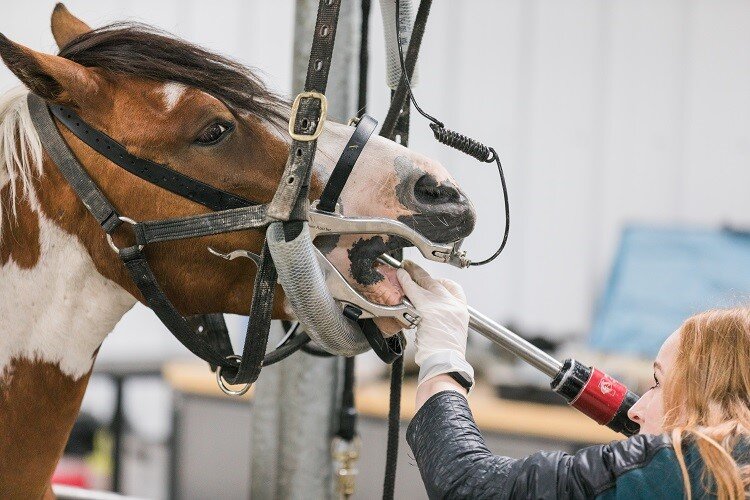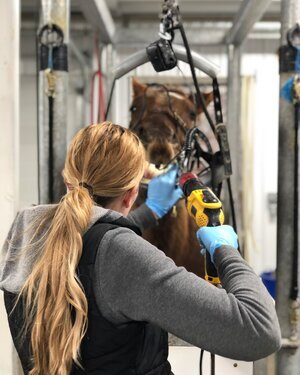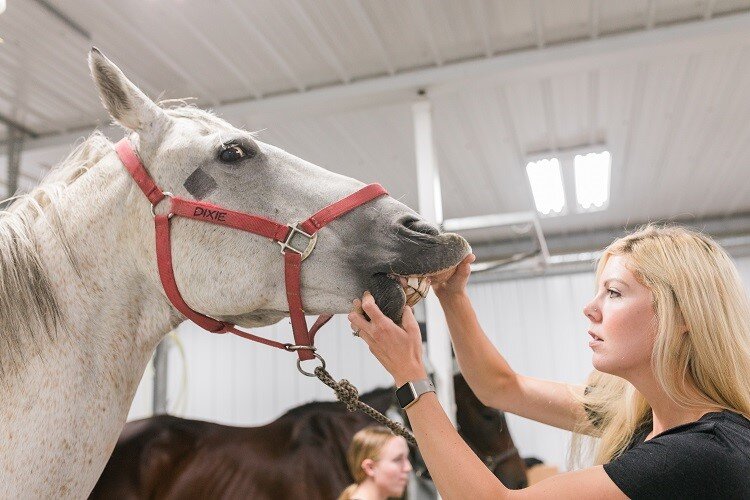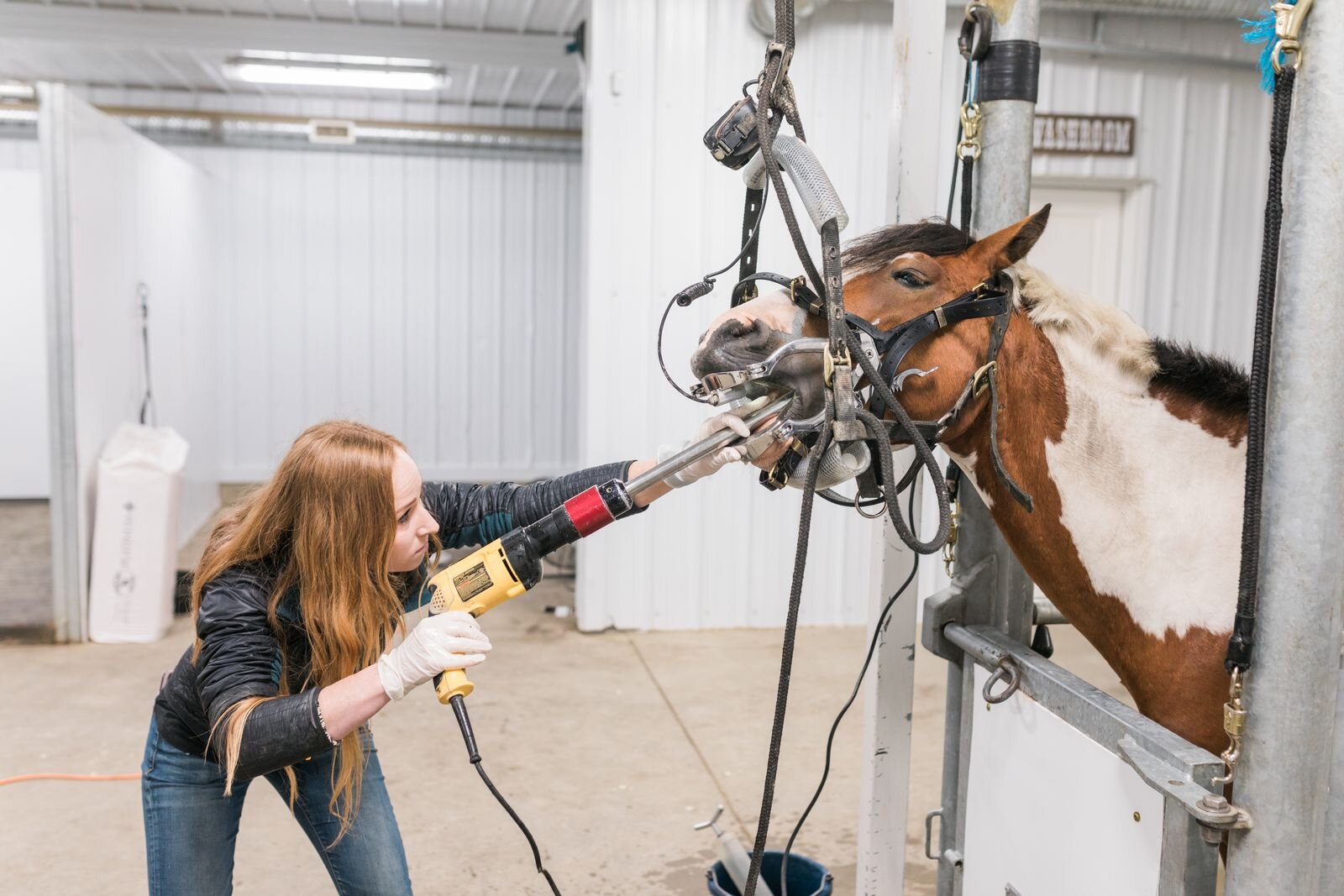Dental health is important for all horses in all life stages, from performance athletes to retired seniors.
Dental issues can cause your horse to be uncomfortable and thus have bit issues, lose weight, become head shy, etc. Routine dental care can help your horse stay healthy and happy.
We provide dentistry services including but not limited to:
oral examination
power floatation*
extractions
dental radiology
*For power floats on farm, we require a clean, dry area with power, as well as an overhanging beam (rafter, stall door, etc.) in order to lift the horse’s head up for the procedure. We offer all dentistry services at our clinic if you do not have appropriate facilities on your farm.
Commonly asked questions regarding dental floats:
What is a dental float?
Horses have teeth that continuously erupt throughout their lifetime, referred to as hypsodont teeth. The teeth naturally wear down approximately 2-4mm per year with adequate foraging, however it is not uncommon for the natural wear of the teeth to occur unevenly in most horses. The uneven grinding can cause large points or hooks on single teeth that damage the cheek and tongue, or an entire “wave” of different sized teeth in a row. These irregularities can lead to pain and irritation and in turn, weight loss, behavioral problems, or more serious dental issues. Chewing of forage efficiently is vital for a horse to achieve appropriate digestion and in turn, absorb all essential nutrients. “Floating” is the practice of filing these naturally formed, sharp and damaging points of the teeth down to maintain a healthy mouth and an appropriate bite for adequate chewing.
At what age should my horse first be floated?
A common rule of thumb is that a horse’s mouth be examined prior to the beginning of any training – typically around 2 years old. While this is definitely a great time, the truth is that it is never too early to have your horse’s mouth examined! There is a lot of changes happening in the mouth as a foal grows and therefore lots of opportunity for problems to arise, including general sharp points, abnormal wear, retained caps, wolf teeth, etc. The best thing an owner can do is monitor their young horses for common signs of dental complications including abnormal chewing, jaw swelling, dropping feed, inappetence or weight loss. Oral care early in a horse’s life can often catch problems before they arise and lead to less costly dental procedures for them in the future.
why does my horse needs to be floated, but horses in the wild do not?
We expect our horses to perform as athletes, executing many different things that would never be asked of a wild animal. We want them to stay in peak condition, accept a bridle, and perform under saddle, while horses in the wild are only really expected to survive. Another thing to consider is that the average lifespan of a horse in the wild is only approximately 12 years old, whereas your domesticated horse can live past 30. A horse in the wild could absolutely benefit from dental work, and in some instances is the reason for thier shortened life.
How often should my horse be floated?
There are many factors that can dictate how often your horse should be floated including age, breed, dental history and desired use. Every horse should have an oral exam completed by a veterinarian once a year. Due to the process of permanent teeth replacing deciduous teeth, there is constant ongoing changes happening in the juvenile mouth until a horse is at least five years old. Senior horses also experience frequent changes as their teeth begin to enter the end-of-life stages. Our veterinarians often recommend more frequent floats for horses under 5 years old and over 18 years old. Possible dental complications, including missing or fractured teeth, is another example of something that might require more frequent care. At your yearly oral dental exam and float, your veterinarian will be able to recommend an appropriate schedule for your individual horse’s needs.
Are equine dentists the same as veterinarians?
Veterinarians, unlike human doctors, are extensively trained in equine dentistry during medical school, along with many additional courses of continuing education post graduation. Under most circumstances, some sedative is required to complete an appropriate dental float effectively, in order to provide the safest possible experience for the horse and the floater. In Alberta, veterinarians are the only professionals legally allowed to prescribe sedation to an animal for many health and safety reasons. There are equine dental courses for non-veterinarians available, however any individual practicing animal dentistry who partakes in these types of courses are not licensed to be administering medication without a veterinarian present, to be performing extensive dental procedures and are not held accountable by an accredited association. There are some instances, however, that a veterinarian refers to their title as an equine dentist because they are a Doctor of Veterinary Medicine but choose to practice only dentistry, which is very appropriate. There are other instances where a trained professional can work under the supervision of a veterinarian to administer medication and a perform a float.
Our recommendation is that you actively research the title of who you are getting to work on your horses teeth prior to your appointment to make sure it is legally allowed and in the best interest of your horse.
Will you file down my horse’s incisors as well?
Yes, incisors will be addressed by your veterinarian as needed. Did you know, changing the bite of a horse by altering the incisors by 2-3mm in the front will alter the bite by 7-8mm in the back? Contrary to some belief, incisors should never have a leveled or “cut” appearance straight across. This often leads to exposed pulp cavity, tooth infections, and horses going off feed due to pain. Your veterinarian will address the hooks that form on incisors to maintain a comfortable bite while being careful to not alter the appropriate chewing pattern of the mouth.
To learn more about our other available services, please click the links below.





